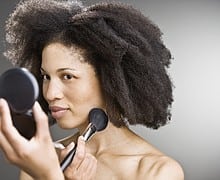If it sounds too good to be true, it probably is
Americans spend a lot of money on creams, lotions and other cosmetics that promise to improve their skin, hair and even eyelashes.
But sometimes those promises go too far.
The Food and Drug Administration (FDA) warns cosmetics companies when they make claims about their products that classify them as drugs, not cosmetics. FDA has issued warning letters citing drug claims associated with topical skin care, hair care and eyelash/eyebrow preparations, noted on both product labeling and websites. Some examples of the drug claims cited are acne treatment, dandruff treatment and hair restoration.
These letters state that the products are being marketed with drug claims—indicating that they are intended to treat or prevent disease, or change the body’s structure or functions. The agency tells companies that they need to remove any drug claims from their products’ labeling or seek FDA approval to market these products as drugs.
“Consumers need to know that these drug claims have not been proven to FDA when they are making a decision to purchase one of these products,” says Linda M. Katz, M.D., director of FDA’s Office of Cosmetics and Colors. “These products must be evaluated by FDA as drugs before the companies can make claims about changing the skin or treating disease.”
Some of the drug claims have included promises to increase production of collagen and elastin, resulting in skin that is more elastic and firmer, with fewer wrinkles.
Some get even more specific, such as claims that products reduce inflammation, regenerate cells, prevent facial muscle contractions, boost activity of genes, or give you the same results as injections or surgery. Others promise to treat medical conditions, such as acne, rosacea, eczema and psoriasis.
Federal law defines a cosmetic, in part, as a product designed for “cleansing, beautifying, promoting attractiveness or altering the appearance.” The law does not require FDA approval of cosmetics before they go on the market.
A drug is defined, in part, as a product “intended for use in the diagnosis, cure, mitigation, treatment or prevention of disease,” or “intended to affect the structure or any function of the body.” Drugs generally are subject to FDA review and approval before they can be marketed.
According to Katz, many companies have crossed the line between saying that their products will enhance a person’s appearance to stating that they will make structural changes to the skin, and even prevent or treat certain medical conditions.
Katz adds that FDA has been tracking claims made about cosmetic products for several years and has seen a proliferation of unlawful, claims on the Internet and on product packaging. “You walk into a store and see shelves of wonder products. If they’re going to be making drug claims, the products need to be evaluated as drugs,” she says.
If companies fail to comply, FDA may take additional action beyond a warning letter, which could include removal of a product from the market.
Jane Liedtka, M.D., a dermatologist at FDA, explains that the agency regulates many skin creams and lotions as drugs, such as products used to treat acne or psoriasis. These products make specific therapeutic claims that FDA reviews to make sure they are accurate, she says.
So faced with the possibility that some cosmetic skin products might be making drug claims that haven’t been evaluated by FDA, how can a consumer choose the right cream or lotion?
There’s no one-size-fits-all answer, Liedtka says.
But in general:
Products intended to cleanse or beautify are generally regulated as cosmetics.
Products intended to treat or prevent disease, or affect the structure or function of the body, are drugs.
Some products are both cosmetics and drugs. Examples include anti-dandruff shampoos and antiperspirant-deodorants, as well as makeup with SPF numbers. They must meet the requirements for both cosmetics and drugs, as applicable.
What if a skin product comes with the suggestion that it can turn back the biological clock? Consumers might think that these products can be used as effectively as, or instead of, more costly procedures, Liedtka says. “If a skin cream says it works better than a facelift … well, people wouldn’t be getting facelifts anymore.”
That’s a sentiment that Katz shares. “If a product seems too good to be true,” she says, “it probably is.”
Photo: Depositphotos






